高中英语重点词汇、词组辨析(非常好)
高考高中英语易混淆50组重点词语分类辨析+例句汇总
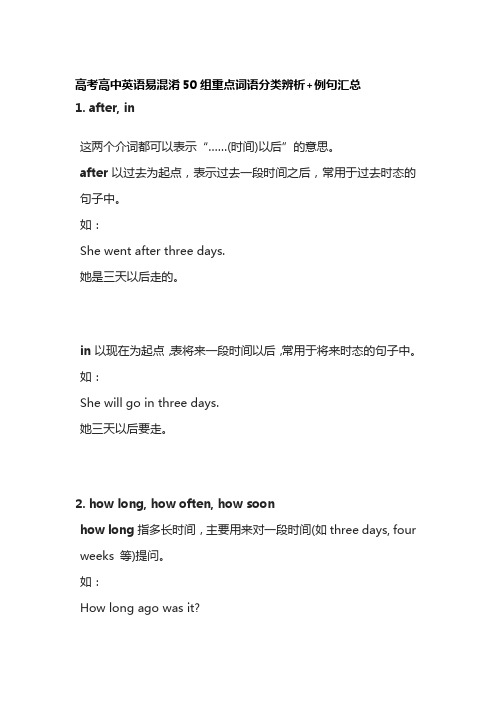
高考高中英语易混淆50组重点词语分类辨析+例句汇总1. after, in这两个介词都可以表示“……(时间)以后”的意思。
after以过去为起点,表示过去一段时间之后,常用于过去时态的句子中。
如:She went after three days.她是三天以后走的。
in以现在为起点,表将来一段时间以后,常用于将来时态的句子中。
如:She will go in three days.她三天以后要走。
2. how long, how often, how soonhow long指多长时间,主要用来对一段时间(如three days, four weeks 等)提问。
如:How long ago was it?这是多久前的事了?how often指每隔多久,主要用来对频率副词或状语(如once a week等)提问。
如:—How often does he come here? —Once a month.他(每隔)多久来一次?每月一次?how soon指再过多久,主要用来对表示将来的一段时间(in an hour, in two weeks 等)提问。
如:How soon can you come?你多快能赶来?3. few, a few, little, a little, several, somefew 和little的意思是否定的,表示“很少”或“几乎没有”;而a few和a little的意思是肯定的,表示“有一些,有一点儿”。
few 和a few修饰可数名词;little 和a little 修饰不可数名词。
several用于修饰可数名词,语意比a few和some更肯定,含有“好几个”的意思。
some可修饰可数名词,也可修饰不可数名词,从数量上说,它有时相当于a few 或a little,有时指更多一些的数量。
4. the other, anotherthe other指两个人或事物中的“另一个”,表示特指。
高考英语重点词汇辨析和易错词汇介绍

高考英语重点词汇辨析和易错词汇介绍英语学习的基础是掌握词汇,为了帮助大家更好的掌握一些英语词汇,下面店铺的小编将为大家带来高考英语的重点词汇辨析,希望能够帮助到大家。
高考英语重点词汇辨析1.accuse / chargeaccuse 和charge都有“指责,控告”之意,有时可通用,但结构不一样。
accuse不一定针对重大过失或罪行,其结构为accuse sb of sth。
而charge一般用于重大过失或罪行,其结构为charge sb with sth,此结构还有“使某人负有……责任”之意。
例如:例1:My father accused me of my being too careless. (父亲责备我太粗心。
)例2:He accused me of neglecting my duty. (他指控我玩忽职守。
)例3:He charged me with neglecting my duty. (同上)例4:Jimmy was charged with murder. (吉米被控谋杀。
)例5:He was charged with an important task. (他担负有一项重要任务。
)2.add / add to / add up / add up toadd:增加,把……加上。
add…to…:把……加到。
例如:例6:At the end of the party, we added another program.例7:You needn’t add any water to the medicine.add to:增添。
指增添喜悦、悲伤、麻烦等。
例如:例8:His coming added to our trouble. (他的到来给我们添了麻烦。
)add up:加起来。
例如:例9:Have you added up all the numbers?add up to:总计。
高中英语重点词、词组、短语辨析

高中英语重点词、词组、短语辨析35例1. in a moment, at the moment, at any moment, for the moment, for a moment, the moment…in a moment表示“过一会儿”,常用在将来时中。
如:I will be back in a moment. 我过一会儿就回来。
at the moment表示“目前”,相当于at present如:I am very busy at the moment. 我现在很忙。
at any moment表示“随时”。
如:He can be here at any moment. 他随时都有可能来。
for the moment表示“暂时”。
I don’t want to change my job for the moment. 我暂时还不想换工作。
for a moment的意思是“一会儿”,表示动作的持续。
He said that he would be away for a moment.the moment可以引导一个时间状语从句,翻译成“一……就……”。
如:She cried the moment she saw him.2. in front of, in the front ofin front of的意思是“在……的前面”,表示二者不同处于一个范围;in the front of的意思是“在……的前部”,表示包含的关系。
There is a big three in front of the house. 房子前面有一颗大树。
There is a table in the front of the room. 屋子前面有一张桌子。
3. by bus, on the bus介词by可以表示乘坐某种交通工具,前面不加任何冠词。
如by bike/plane/air/boat等。
但在用其它的介词时,则须加上定冠词。
高中英语重点词汇、词组辨析三三
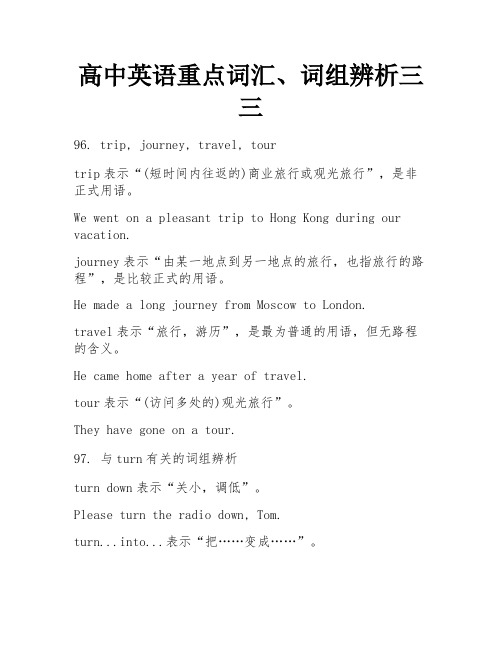
高中英语重点词汇、词组辨析三三96. trip, journey, travel, tourtrip表示“(短时间内往返的)商业旅行或观光旅行”,是非正式用语。
We went on a pleasant trip to Hong Kong during our vacation.journey表示“由某一地点到另一地点的旅行,也指旅行的路程”,是比较正式的用语。
He made a long journey from Moscow to London.travel表示“旅行,游历”,是最为普通的用语,但无路程的含义。
He came home after a year of travel.tour表示“(访问多处的)观光旅行”。
They have gone on a tour.97. 与turn有关的词组辨析turn down表示“关小,调低”。
Please turn the radio down, Tom.turn...into...表示“把……变成……”。
If we cut down forests, we’ll turn the land into a desert.turn off表示“关掉(水、电、收音机)”。
Before you leave, make sure the electricity is turned off.turn out表示“出席、证明是,结果是”。
It turned out that she was a friend of my sister.turn up表示“到达,出现”。
He didn’t turn up until it was dark.turn over表示“翻动,耕翻”。
He turned over in bed all the time last night.98. try to do, try doingtry to do表示“努力、企图做某事”,(表示目的)。
高中英语重点辨析词语
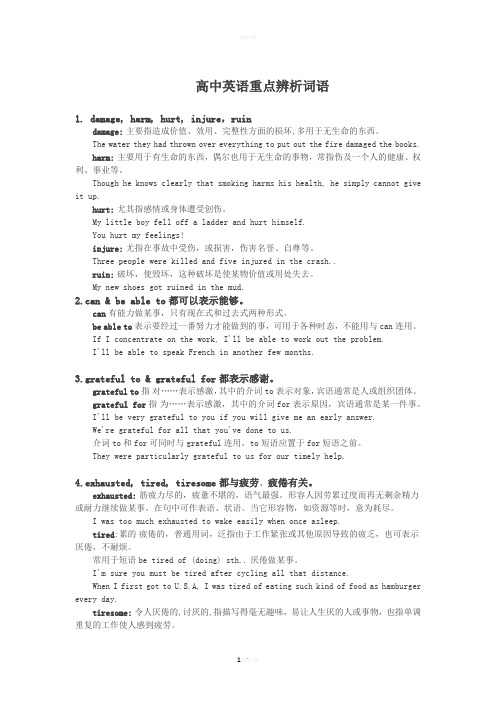
高中英语重点辨析词语1. damage, harm, hurt, injure,ruindamage:主要指造成价值、效用、完整性方面的损坏,多用于无生命的东西。
The water they had thrown over everything to put out the fire damaged the books.harm:主要用于有生命的东西,偶尔也用于无生命的事物,常指伤及一个人的健康、权利、事业等。
Though he knows clearly that smoking harms his health, he simply cannot give it up.hurt:尤其指感情或身体遭受创伤。
My little boy fell off a ladder and hurt himself.You hurt my feelings!injure:尤指在事故中受伤,或损害,伤害名誉、自尊等。
Three people were killed and five injured in the crash..ruin:破坏,使毁坏,这种破坏是使某物价值或用处失去。
My new shoes got ruined in the mud.2.can & be able to都可以表示能够。
can有能力做某事,只有现在式和过去式两种形式。
be able to表示要经过一番努力才能做到的事,可用于各种时态,不能用与can连用。
If I concentrate on the work, I'll be able to work out the problem.I'll be able to speak French in another few months.3.grateful to & grateful for都表示感谢。
grateful to指对……表示感激,其中的介词to表示对象,宾语通常是人或组织团体。
高中英语语法之重难点词语精析

高中英语语法之重难点词语精析
高中英语语法之重难点词语精析
高中英语语法之重难点词语精析
一、常用词语
1. exercise 意为习题;(书面)练习时为可数名词。
例如:
Study the lesson, and then do the exercises at the end.
学课文,然后做后面的练习。
exercise 还可表示(体育或器官)运动;活动;锻炼,笼统指运动时为不可数名词;指具体某项运动时为可数名词。
例如:If you don't take / get more exercise, you'll get fat.
你不多锻炼就会发胖。
gymnastic exercises 体操运动
breathing exercises 呼吸运动
2. cover 意为盖,遮盖;采访,报道。
例如:
The ruins were soon covered by thick forests.
废墟很快被茂密的树林所覆盖。
Reporters are then sent to cover the events.
然后记者被派去采访这个事件。
试 cover 在不同语境中的词义变化:
He covers 5 kilometers an hour.
他每小时行走 5 公里。
How many pages have you covered?
你已读完 / 讲完 / 学完多少页了?。
高中英语语法知识汇总之词语辨析整理
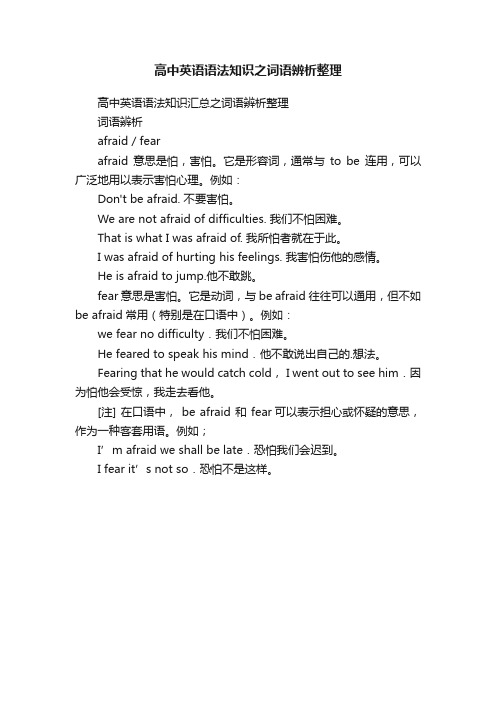
高中英语语法知识之词语辨析整理
高中英语语法知识汇总之词语辨析整理
词语辨析
afraid / fear
afraid 意思是怕,害怕。
它是形容词,通常与to be连用,可以广泛地用以表示害怕心理。
例如:
Don't be afraid. 不要害怕。
We are not afraid of difficulties. 我们不怕困难。
That is what I was afraid of. 我所怕者就在于此。
I was afraid of hurting his feelings. 我害怕伤他的感情。
He is afraid to jump.他不敢跳。
fear 意思是害怕。
它是动词,与be afraid往往可以通用,但不如be afraid常用(特别是在口语中)。
例如:
we fear no difficulty.我们不怕困难。
He feared to speak his mind.他不敢说出自己的.想法。
Fearing that he would catch cold, I went out to see him.因为怕他会受惊,我走去看他。
[注] 在口语中, be afraid 和 fear可以表示担心或怀疑的意思,作为一种客套用语。
例如;
I’m afraid we shall be late.恐怕我们会迟到。
I fear it’s not so.恐怕不是这样。
高一英语单词和词组的详解

Words & expressions
1.recognize (1) to know and remember sb. or sth. one has seen before “见了某人或某物而认出”,是一时的动作,不可以和段时间状语连用,这一点与know不同。试比较: As soon as I saw him,I recognized him. I have known him for five years. (2) to accept 承认 认可 They recognized the new government. That’s a recognized method of teaching English.
提出;提前
收获;引进
引起;导致
出版
教育,培养
9.day and night= night and day/all day and all night I think of you day and night. Phrases: in the day (daytime) 在白天 at night / in the eveo this day 直到今天 Eg. To this day, I still don’t know why he did it.
I‘ll call at your house tomorrow morning.Are you free then?
令人愉快的, 有趣的 We had a lovely holiday. What a lovely joke! It’s lovely and warm here. She is as lively as a cat. They had a lively time.
高中高二英语重点单词短语及语法

高中高二英语重点单词短语及语法在高中高二阶段学习英语,有一些重要的单词、短语和语法是我们需要重点掌握的。
下面将逐一介绍这些重点内容。
一、重点单词1. achieve:实现,达到例句:I hope to achieve my goals in life.2. analyze:分析例句:We need to analyze the data to understand the results.3. attitude:态度例句:He has a positive attitude towards studying.4. benefit:好处例句:Exercise has many benefits for your health.5. challenge:挑战例句:The exam was a real challenge, but I managed to pass.6. conflict:冲突例句:There is a conflict between what he says and what he does.7. contribute:贡献例句:Everyone should contribute to protecting the environment.8. demonstrate:展示,证明例句:She demonstrated her skills in the piano competition.9. enhance:增强例句:Studying abroad can enhance your language skills.10. establish:建立例句:We need to establish a good relationship with our neighbors.11. global:全球的例句:Climate change is a global issue that affects us all.12. identify:识别,认定例句:It is important to identify the problem before finding a solution.13. impact:影响例句:His words had a big impact on me.14. investigate:调查例句:The police are investigating the crime.15. maintain:维持,保持例句:We need to maintain a healthy lifestyle.二、重点短语1. according to:根据例句:According to the weather forecast, it will rain tomorrow.2. as a result of:由于例句:As a result of his hard work, he got a promotion.3. in addition to:除了...之外例句:In addition to English, he can also speak French and Spanish.4. on the other hand:另一方面例句:She is smart, but on the other hand, she can be quite lazy.5. take into account:考虑到例句:When making a decision, you should take into account all the factors.6. with the help of:在...的帮助下例句:With the help of my teacher, I was able to improve my grades.7. in order to:为了例句:I need to study hard in order to pass the exam.8. in spite of:尽管例句:In spite of the rain, they continued with the outdoor activity.9. by means of:通过例句:We can communicate by means of email or phone.10. due to:由于例句:The game was cancelled due to bad weather.三、重点语法1. 直接引语和间接引语直接引语和间接引语是我们在句子中常用的两种表达方式。
高中英语重点词语辨析汇总(3)

高中英语重点词语辨析汇总(3)51.lie / lay(注意动词变化形式)动词原形过去式过去分词现在分词中文意思lie lay lain lying躺下;位于lie lied lied lying说谎lay laid laid laying安放;下蛋例259:The boy who lay on the table lied to me that the hen lying there laid two eggs that day.(躺在桌面上的那男孩对我撒谎说,蹲在那里的母鸡当天下了两个蛋。
)52.lie in / lie on / lie tolie in:位于(属于,包含其中)。
lie to:位于(不属于,隔开)。
lie on:位于(接壤,比邻关系)。
例如:例260:Fujian lies in the southeast of China, to the west of Taiwan, and on the east of Jiangxi.53.lose / misslose:丢失,失去;迷路。
例如:例261:She lost her way in the mist(雾).miss:丢失;不见;错过;遗漏;想念。
例如:例262:—When did you lose your purse? (你什么时候丢了钱包?)—I don’t know. When I got home, I found it missing.(不知道。
我到家时,发现钱包不见了。
)例263:It’s a very interesting film; you mustn’t miss it.(这是一部很有趣的电影,千万别错过了。
)54.prepare / prepare for / make preparations for / be prepared forprepare:准备。
prepare for / make preparations for (=get ready for):为……而准备。
高中常用英语词汇辨析
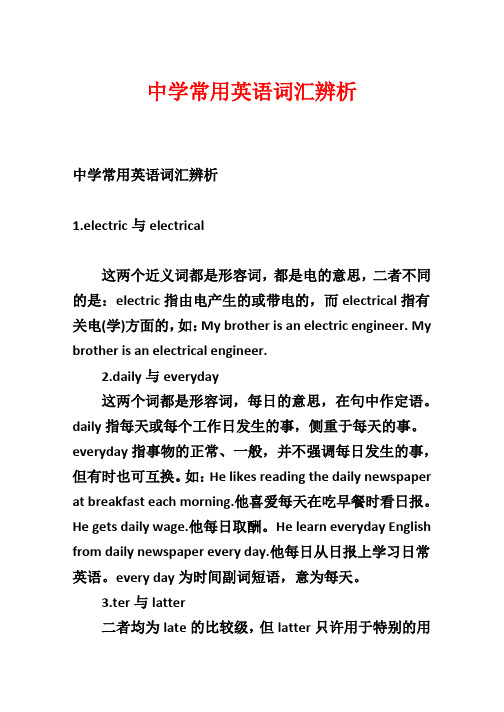
中学常用英语词汇辨析中学常用英语词汇辨析1.electric与electrical这两个近义词都是形容词,都是电的意思,二者不同的是:electric指由电产生的或带电的,而electrical指有关电(学)方面的,如:My brother is an electric engineer. My brother is an electrical engineer.2.daily与everyday这两个词都是形容词,每日的意思,在句中作定语。
daily指每天或每个工作日发生的事,侧重于每天的事。
everyday指事物的正常、一般,并不强调每日发生的事,但有时也可互换。
如:He likes reading the daily newspaper at breakfast each morning.他喜爱每天在吃早餐时看日报。
He gets daily wage.他每日取酬。
He learn everyday English from daily newspaper every day.他每日从日报上学习日常英语。
every day为时间副词短语,意为每天。
3.ter与latter二者均为late的比较级,但latter只许用于特别的用法,且不与than连用。
later作形容词或副词时,意为较迟的(地),较后的(地),如:in ones later life在晚年。
He came later than usual.他比平常晚来一点。
latter作形容词时,通常用于名词前,意为后者的,末尾的,如:in the latter part of a speech演说的后半段,the latter half of the year 下半年。
latter还可用作代词,the latter与the former是一组反义词组。
4.pick, pick out, select与choose这几个词都表示选择选择。
pick是口头用语,指无需细致考虑或鉴别就能作出的选择。
高考英语重点词汇总结
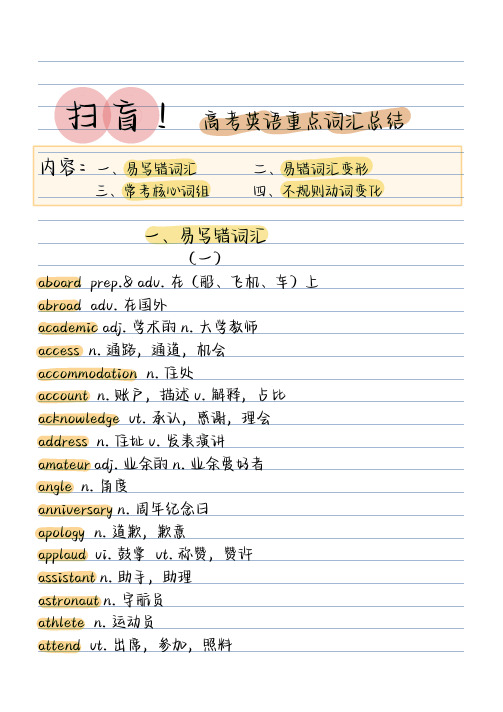
扫盲!高考英语重点词汇总结内容:一、易写错词汇二、易错词汇变形三、常考核心词组四、不规则动词变化一、易写错词汇(一)aboard prep.& adv. 在(船、飞机、车)上abroad adv. 在国外academic adj. 学术的 n. 大学教师access n. 通路,通道,机会accommodation n. 住处account n. 账户,描述 v. 解释,占比acknowledge vt. 承认,感谢,理会address n. 住址 v. 发表演讲amateur adj. 业余的 n. 业余爱好者angle n. 角度anniversary n. 周年纪念日apology n. 道歉,歉意applaud vi. 鼓掌 vt. 称赞,赞许assistant n. 助手,助理astronaut n. 宇航员athlete n. 运动员attend vt. 出席,参加,照料available adj. 可利用的,有空的awkward adj. 笨拙的,尴尬的,不方便的(二)badminton n. 羽毛球balloon n. 气球barbecue n. 烧烤 v. (用烤架)烧烤beard n. 胡子,胡须biography n. 传记biology n. 生物学board n. 木板,棋盘,董事会,膳食费bounce v. 弹回,弹跳bind vt. 捆绑,约束(bind-bound-bound)bound adj. 肯定会 be bound to dobridge n. 桥,纽带 vt. 消除分歧,横跨brief adj. 简短的,简洁的broad adj. 宽阔的,广泛的,粗略的brochure n. 小册子budget n. 预算bunch n. 一束,一串,一群 v. 聚拢,簇拥(三)camel n. 骆驼campaign n. 运动,战役candidate n. 候选人cautious adj. 小心谨慎的ceremony n. 典礼,仪式champion n. 冠军chief n. 主要的,首要的chemistry n. 化学Christmas n. 圣诞节cinema n. 电影院civilization n. 文明,文化colleague n. 同事comment n.&v. 评论concern v.&n. 涉及,关心concentrate v. 集中注意力castle n. 城堡conference n. 会议consult v. 咨询,商量consume v. 消耗,消费convenient adj. 便利的,方便的courage n. 勇气,胆量curious adj. 好奇的corner n. 角落crayon n. 蜡笔二、易错词汇变形(一)absent → n. absence accurate → n. accuracy acquire → n. acquisition act → n. activity 活动adapt → n. adaptation admire → n. admiration admit → n. admission agriculture → adj. agricultural anxious → n. anxiety approve → n. approvalapply → n. application 申请 apply → n. applicant 申请人appoint → n. appointment appreciate → n. appreciation architect → n. architecture argue → n. argument arrange → n. arrangement arrive → n. arrivalassist → n. assistant 助手 assist → n. assistance 帮助assume → n. assumption associate → n. association athlete → adj. athletic attract → n. attraction attract → adj. attractive aware → n. awareness(二)bacterium →复数bacteria beautiful → n. beauty behave → n. behavior/behaviour believe → n. beliefbelong → n. belonging benefit → adj. beneficial bright → v. brighten brighten → n. brightness behave → n. behavior/behaviour believe → n. beliefbrave → n. bravery breath → v. breathebore → adj. 感到无聊,厌烦的 bored→ adj. 令人无聊的 boring→ n. 厌烦,厌倦 boredom(三)care → adj. careful 小心仔细的 careful → n. carefulness → adj. careless → adv. carefully candy → n. candies 变复数 caution → adj. cautious casual → adv. casually celebrate → n. celebration centre/center → adj. central challenge → adj. challenging change → adj. changing cheer → adj. cheerfulcloud → adj. cloudy choose → n. choice chemistry → adj. chemical 化学的 collect → n. collection → n. chemist 化学家→n. collector 收藏家comfort → adj. comfortable commit → n. commitment compete → n. competition 比赛→ n. competitor 参赛者,竞争者→ n. competence 能力complete → n. completion company → v. accompany→ n. companion 伙伴conclude → n. conclusion confident → n. confidence congratulate → n. congratulation concern → adj. concerned confuse → adj. confused 感到困惑的→ adj. confusing 令人困惑的consider → n. consideration→ adj. considerate 体贴的consult → n. consultant 顾问 consume → n. consumption contain → n. container 容器 conduct → n. conductor 指挥 convenient → n. convenience→ adj. inconvenient 不方便的criterion → pl. criteria crowd → adj. crowded contribute →n. contribution cruel → n. cruelty correct → n. correction courage → v. encouge 鼓励culture → adj. cultural curious → n. curiosity custom → adj. accoustomed construct → n. construction create → n. creation创造,创建→ n. creature 生物→ n. creativity 创造力→adj. creative 有创造力的complain → n. complaint curriculum → pl. curricula cycle → n. cyclist 骑自行车的人三、常考词组(一)1.have the ability to do sth 有能力做某事2.be able to do 能够做某事3.be absorbed in 全神贯注于4.have/ get the access to 有得到sth的机会/享用sth的权利5.add up to 合计达 add to 添加,增添6.in addition to 除了……之外7.admit doing 承认做sth8.in advance 提前,事先9. be afraid to do sth 不敢做sthbe afraid of sth 害怕sth10. at the age of 在……岁的时候11. agree on sth 就sth达成一致意见;agree with sb 同意sbagree to do sth 同意去做sth12.ahead of 在……的前面13.aim to do 目标去做,力求做14.allow sb to do 允许sb去做sthallow doing允许做sth15.be anxious to do 急切的去做sth16.have/ make an appointment with sb 和sb有预约 have/ make an appointment to do 预约去做sth17.pay attention to 注意sth18.attract sb to sth 把sb吸引到sth19.avoid doing 避免做sth20.be aware of 意识到,了解(二)1.back and forth 来回2.keep the balance of nature 保持生态平衡3.ban sb from doing4.base A on B 把A建立在B上be based on 以sth为基础5.bear/ keep sth in mind 记住sthbear to do/ doing 忍受做sth6.in bed 卧病在床in the bed 在床上7. in the beginning 首先at the beginning of sth 在sth的开端8. belong to 属于……9. be beneficial to 对sth有益get/ gain benefit from 从……那里获益10.had better (not) do 最好(不)做sth11.be to blame for sth 因为sth应该受到指责blame sb for sth 因为sth指责sbblame sth on sb 把sth归咎于sb12.be bored with sth 对sth厌烦13. be bound to do 注定会做14. at the bottom of 在sth的底部15. break out 爆发break into 强行闯入16. in brief 简单地说17.be busy with 忙于做sthbe busy (in) doing(三)1.call on sb 顺便拜访sb2.catch up with 赶上3.the cause of sth的起因4.miss/ have/ get a chance to do sth 错过/有/得到机会去做sth5.have a good command of 精通,掌握command sb to do 命令sb去做mit oneself to (doing) sth 致力于7.have sth in common 有共同之处8.consider doing 考虑做sthconsider sb as/ (to be) 认为sb 是take sth into consideration 把sth加以考虑9.consist of 由……组成10.on the contrary 相反be contrary to 和...相反11.cope with 对付/处理12.at the cost of 以……的代价13.at the crossroads 在十字路口14. be crowded with 挤满了15.be curious about sth 对sth好奇16.concentrate on 集中注意力与四、不规则动词变化(一)arise → arose → arisen awake → awoke → awoken(二)bear → bore → born beat → beat → beaten become → became → become bend → bent → bent bite → bit → bitten bleed → bled → bled blow → blew → blown break → broke → broken bring → brought → brought build → built → built burst → burst → burst buy → bought → bought(三)cast → cast → cast catch → caught → caught choose → chose → chosen clap → clapped → clapped come → came → come cost → cost → cost commit → committed → committedcut → cut → cut。
高中英语高考高频词语辨析汇总(共50组)
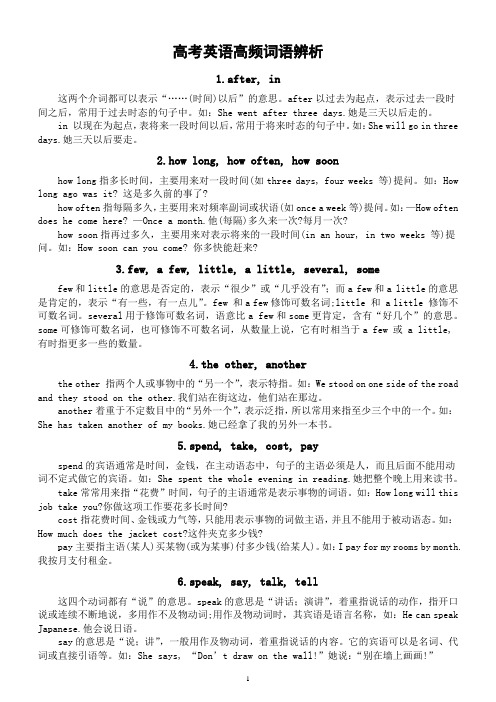
高考英语高频词语辨析1.after, in这两个介词都可以表示“……(时间)以后”的意思。
after以过去为起点,表示过去一段时间之后,常用于过去时态的句子中。
如:She went after three days.她是三天以后走的。
in 以现在为起点,表将来一段时间以后,常用于将来时态的句子中。
如:She will go in three days.她三天以后要走。
2.how long, how often, how soonhow long指多长时间,主要用来对一段时间(如three days, four weeks 等)提问。
如:How long ago was it? 这是多久前的事了?how often指每隔多久,主要用来对频率副词或状语(如once a week等)提问。
如:—How often does he come here? —Once a month.他(每隔)多久来一次?每月一次?how soon指再过多久,主要用来对表示将来的一段时间(in an hour, in two weeks 等)提问。
如:How soon can you come? 你多快能赶来?3.few, a few, little, a little, several, somefew和little的意思是否定的,表示“很少”或“几乎没有”;而a few和a little的意思是肯定的,表示“有一些,有一点儿”。
few 和a few修饰可数名词;little 和 a little 修饰不可数名词。
several用于修饰可数名词,语意比a few和some更肯定,含有“好几个”的意思。
some可修饰可数名词,也可修饰不可数名词,从数量上说,它有时相当于a few 或 a little,有时指更多一些的数量。
4.the other, anotherthe other 指两个人或事物中的“另一个”,表示特指。
高中英语重点词汇词组辨析
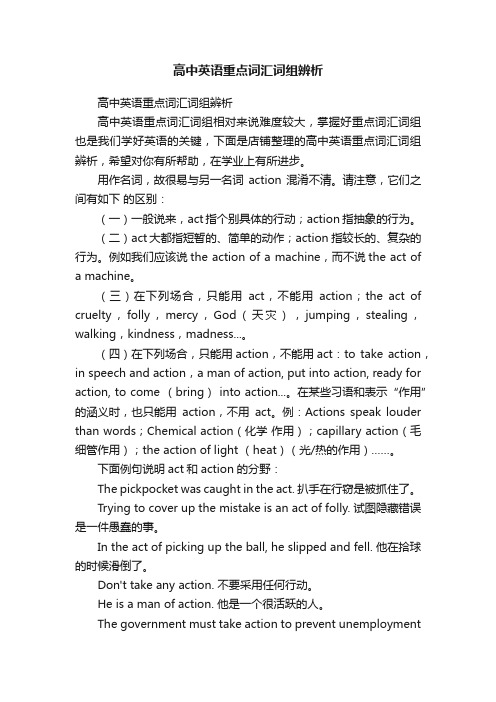
高中英语重点词汇词组辨析高中英语重点词汇词组辨析高中英语重点词汇词组相对来说难度较大,掌握好重点词汇词组也是我们学好英语的关键,下面是店铺整理的高中英语重点词汇词组辨析,希望对你有所帮助,在学业上有所进步。
用作名词,故很易与另一名词action混淆不清。
请注意,它们之间有如下的区别:(一)一般说来,act指个别具体的行动;action 指抽象的行为。
(二)act大都指短暂的、简单的动作;action 指较长的、复杂的行为。
例如我们应该说the action of a machine,而不说the act of a machine。
(三)在下列场合,只能用act,不能用action;the act of cruelty,folly,mercy,God(天灾),jumping,stealing,walking,kindness,madness...。
(四)在下列场合,只能用action,不能用act:to take action,in speech and action,a man of action, put into action, ready for action, to come (bring) into action...。
在某些习语和表示“作用” 的涵义时,也只能用action,不用act。
例:Actions speak louder than words;Chemical action(化学作用);capillary action(毛细管作用);the action of light (heat)(光/热的作用)……。
下面例句说明act和action的分野:The pickpocket was caught in the act. 扒手在行窃是被抓住了。
Trying to cover up the mistake is an act of folly. 试图隐藏错误是一件愚蠢的事。
In the act of picking up the ball, he slipped and fell. 他在拾球的时候滑倒了。
高中英语常用词汇辨析

中学英语常用词汇辨析中学英语常用词汇辨析1. clothes, cloth, clothingClothes统指各种衣服,谓语动词恒久是复数:cloth指布,为不行数动词:clothing为服装的总称,指一件衣服用a piece of clothing, an article of clothing2. incident, accidentIncident指小事务:accident指不幸的事故3. amount, numberAmount后接不行数名词:number后接可数名次:如:a number of students 4. family, house, homeHone家,包括住处和家人:house房子,住宅:family家庭成员,如:My family is a happy one.5. sound, voice, noisesound自然界各种各样的声音:voice人的嗓音:noise噪音,如:I hate the loud noise outside.6. photo, picture, drawingPhoto用照相机拍摄的照片:picture可指相片,图片,电影片:drawing指画的画7. vocabulary, wordVocabulary词汇,一个人拥有的单词量:word详细的单词8. population, peoplePopulation人口,人数:people详细的人9. weather, climateWeather一天内详细的天气状况:climate长期的气候状况10. road, street, path, wayroad详细的马路,马路:street街道:path小路,小径:way道路,途径11. course, subjectCourse课程(可包括多门科目):subject科目(详细的学科),如: a summer course12. course, habitcustom传统风俗,习俗,也可指生活习惯,后接to do: habit生活习惯,习惯成自然,后接of doing13. cause, reasoncause制造成某一事实或现象的干脆缘由,后接of sth./doing sth.: reason 用来说明某种现象或结果的理由,后接for sth./doing sth. 如:the reason for being late14. exercise, exercises, practiceExercise运动,熬炼(不行数):exercises练习(可数):practice(反复做的)练习,如:Practice makes perfect.15. class, lesson作“课”解时,两者可以替换。
高中英语词汇:常用英语词语辨析
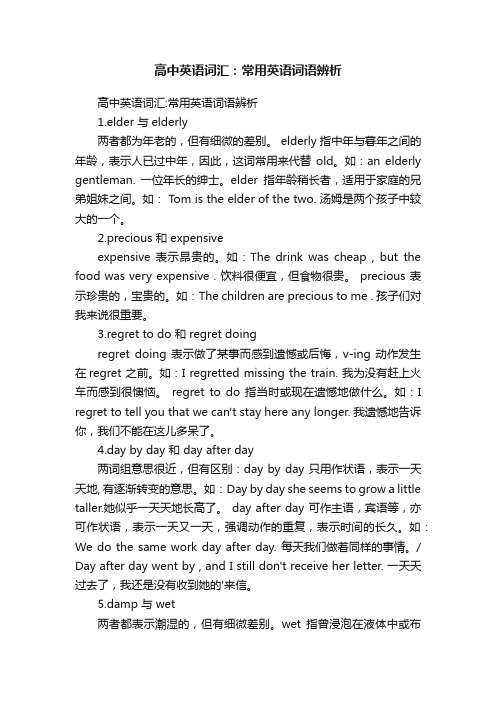
高中英语词汇:常用英语词语辨析高中英语词汇:常用英语词语辨析1.elder 与elderly两者都为年老的,但有细微的差别。
elderly 指中年与暮年之间的年龄,表示人已过中年,因此,这词常用来代替 old。
如:an elderly gentleman. 一位年长的绅士。
elder指年龄稍长者,适用于家庭的兄弟姐妹之间。
如: Tom is the elder of the two. 汤姆是两个孩子中较大的一个。
2.precious 和 expensiveexpensive 表示昂贵的。
如:The drink was cheap , but the food was very expensive . 饮料很便宜,但食物很贵。
precious 表示珍贵的,宝贵的。
如:The children are precious to me . 孩子们对我来说很重要。
3.regret to do 和 regret doingregret doing 表示做了某事而感到遗憾或后悔,v-ing 动作发生在regret 之前。
如:I regretted missing the train. 我为没有赶上火车而感到很懊恼。
regret to do 指当时或现在遗憾地做什么。
如:I regret to tell you that we can't stay here any longer. 我遗憾地告诉你,我们不能在这儿多呆了。
4.day by day 和 day after day两词组意思很近,但有区别:day by day 只用作状语,表示一天天地, 有逐渐转变的意思。
如:Day by day she seems to grow a little taller.她似乎一天天地长高了。
day after day 可作主语,宾语等,亦可作状语,表示一天又一天,强调动作的重复,表示时间的长久。
如:We do the same work day after day. 每天我们做着同样的事情。
高中英语重点词汇、词组辨析(非常好)
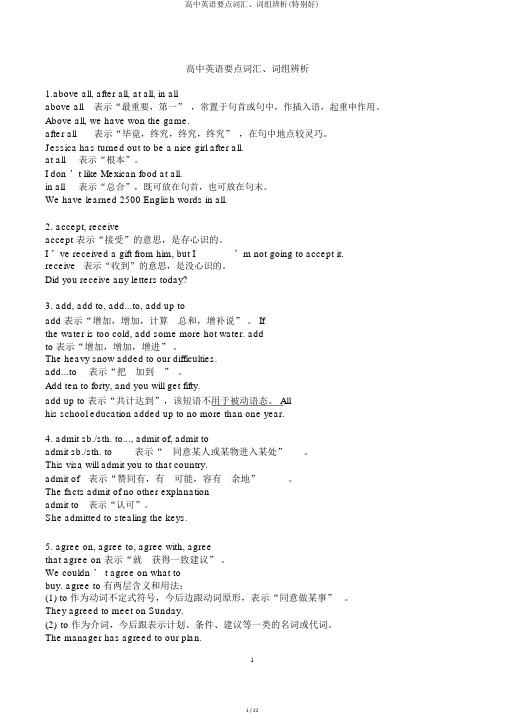
高中英语要点词汇、词组辨析1.above all, after all, at all, in allabove all表示“最重要,第一” ,常置于句首或句中,作插入语,起重申作用。
Above all, we have won the game.after all表示“毕竟,终究,终究,终究” ,在句中地点较灵巧。
Jessica has turned out to be a nice girl after all.at all表示“根本”。
I don ’t like Mexican food at all.in all表示“总合”,既可放在句首,也可放在句末。
We have learned 2500 English words in all.2. accept, receiveaccept 表示“接受”的意思,是存心识的。
I ’ve received a gift from him, but I’m not going to accept it.receive表示“收到”的意思,是没心识的。
Did you receive any letters today?3. add, add to, add...to, add up toadd 表示“增加,增加,计算总和,增补说”。
Ifthe water is too cold, add some more hot water. addto 表示“增加,增加,增进”。
The heavy snow added to our difficulties.add...to表示“把加到” 。
Add ten to forty, and you will get fifty.add up to 表示“共计达到”,该短语不用于被动语态。
Allhis school education added up to no more than one year.4. admit sb./sth. to..., admit of, admit toadmit sb./sth. to表示“ 同意某人或某物进入某处”。
高中重要单词的英语词组辨析
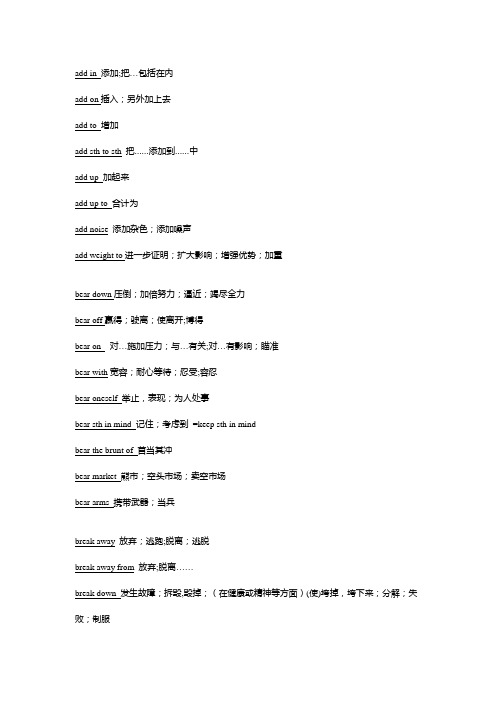
add in 添加;把…包括在内add on插入;另外加上去add to 增加add sth to sth 把……添加到……中add up 加起来add up to 合计为add noise 添加杂色;添加噪声add weight to进一步证明;扩大影响;增强优势;加重bear down压倒;加倍努力;逼近;竭尽全力bear off赢得;驶离;使离开;博得bear on 对…施加压力;与…有关;对…有影响;瞄准bear with 宽容;耐心等待;忍受;容忍bear oneself 举止,表现;为人处事bear sth in mind 记住;考虑到=keep sth in mindbear the brunt of 首当其冲bear market 熊市;空头市场;卖空市场bear arms 携带武器;当兵break away 放弃;逃跑;脱离;逃脱break away from 放弃;脱离……break down 发生故障;拆毁,毁掉;(在健康或精神等方面)(使)垮掉,垮下来;分解;失败;制服break in 打断;闯入;训练;使逐渐习惯break into闯入;非法闯入;破门而入;强行进入break through 突破;突围;有重要创见break of 放弃;改掉(习惯)break off 折断;突然停止,暂停break out 爆发;突发break out of 摆脱(束缚等);突破…break up 关系破裂;打碎,破碎;结束,散会;解散;衰落break with 结束;与…绝交,和…断绝关系;和…决裂bring about 引起;[航]使掉头bring along 带来;使……发展bring back 拿回来;使…恢复;使…回忆起来bring down 降低;打倒,打死;击落bring forward 提出;提前;结转bring in 引进;赚得;生产;增加bring on 导致;引起;使…发展bring off救出;成功地做某事;圆满完成;使实现bring out使……显示出来;出版;制造;使显露bring up 提出;教育;养育;呕出;[航](船等)停下bring round使改变观点;说服;使恢复健康;使复苏bring to mind想起bring to light暴露;揭露;揭示;发现,发掘call at sp。
- 1、下载文档前请自行甄别文档内容的完整性,平台不提供额外的编辑、内容补充、找答案等附加服务。
- 2、"仅部分预览"的文档,不可在线预览部分如存在完整性等问题,可反馈申请退款(可完整预览的文档不适用该条件!)。
- 3、如文档侵犯您的权益,请联系客服反馈,我们会尽快为您处理(人工客服工作时间:9:00-18:30)。
高中英语重点词汇、词组辨析1.above all, after all, at all, in allabove all表示“最重要,首先”,常置于句首或句中,作插入语,起强调作用。
Above all, we have won the game.after all表示“毕竟,终究,终归,到底”,在句中位置较灵活。
Jessica has turned out to be a nice girl after all.at all表示“根本”。
I don’t like Mexican food at all.in all表示“总共”,既可放在句首,也可放在句末。
We have learned 2500 English words in all.2. accept, receiveaccept表示“接受”的意思,是有意识的。
I’ve received a gift from him, but I’m not going to accept it.receive表示“收到”的意思,是无意识的。
Did you receive any letters today?3. add, add to, add...to, add up toadd表示“增加,添加,计算……总和,补充说”。
If the water is too cold, add some more hot water.add to表示“增添,增加,增进”。
The heavy snow added to our difficulties.add...to表示“把……加到……”。
Add ten to forty, and you will get fifty.add up to表示“合计达到”,该短语不用于被动语态。
All his school education added up to no more than one year.4. admit sb./sth. to..., admit of, admit toadmit sb./sth. to表示“……允许某人或某物进入某处”。
This visa will admit you to that country.admit of表示“容许有,有……可能,容有……余地”。
The facts admit of no other explanationadmit to表示“承认”。
She admitted to stealing the keys.5. agree on, agree to, agree with, agree thatagree on表示“就……取得一致意见”。
We couldn’t agree on what to buy.agree to有两层含义和用法:(1)to作为动词不定式符号,其后面跟动词原形,表示“同意做某事”。
They agreed to meet on Sunday.(2)to作为介词,之后跟表示计划、条件、建议等一类的名词或代词。
The manager has agreed to our plan.agree with表示“同意某人意见”,其后可跟表示人的名词或代词。
We didn’t agree with what she said at the meeting.agree that表示“认为……”,其后跟宾语从句。
We agreed that they would deliver the sofa in the morning.6. alone, lonelyalone = by oneself, without others表示“独自一人”,可作表语和宾补。
He went to the separate island all alone.lonely表示“孤独,寂寞”,主观上渴望有伴。
若指地方,则表示“人迹罕至的,荒凉的,偏僻的”,可作定语或表语。
The old man was alone in the house on the top of the hill, but he didn’t feel lonely.7. a number of, the number ofa number of表示“许多”,谓语动词用复数。
A number of visitors pay a visit to the museum every day.the number of表示“……的数目”,谓语动词用单数。
The number of pandas is increasing.8. arrive, get, reacharrive表示“达到,抵达”,不及物动词,后接in (点),at (小地点)。
When will you arrive in London, Mr. Wallace?get表示“到达,抵达”,不及物动词,后接to。
When we got to the airport, the flight had taken off.reach表示“到达,抵达”,及物动词。
His letter reached me this morning.9. at the age of, by the age ofat the age of表示“在……岁时”。
She published a book at the age of ten.by the age of表示“到……岁的时候,在……岁以前”。
By the age of sixteen, he had won ten gold metals.10. at the beginning, in the beginningat the beginning表示“在……,在初……开始的时候”,常与of连用。
All of us should be careful with our work at the beginning of term.in the beginning表示“起初,首先”,相当于at first。
In the beginning, some of us took no interest in this game.11. ashamed, shamefulashamed表示“感到羞耻,觉得惭愧,不好意思”,指主观认为是可耻的。
He was ashamed of losing his wife’s necklace the other day.shameful表示“不可饶恕,可耻”,指事物本身的客观性质是可耻的。
To steal money from a blind person is a shameful act.12. be anxious to, be anxious for, be anxious aboutbe anxious to表示“急于,渴望”,其中to是不定式符号,后面接动词原形。
We are anxious to know the result of the examination.be anxious for表示“渴望”,后面接名词或代词时,强调渴望得到某物或渴望了解某事。
The young lady was anxious for a diamond necklace.be anxious about表示“对……感到不安,为……担心,为……忧虑”。
She was anxious about her lost son.13. believe, believe inbelieve表示“相信(事物的真实性,人的诚实)”。
I don’t believe you.believe in表示“信奉,信仰,信任”。
We believe in him.14. be made of, be made from, be made in, be made by, be made up ofbe made of表示“由……制成”,指从原料到制成品,强调形状变化,并无本质变化(属物理变化)。
This table is made of wood.be made from表示“由……制成”,指从原料到制成品,强调质的变化,并已无法复原(属化学变化)。
Paper is made from wood.be made in表示“某物何时制造的”或“何地产的”。
This bike was made in Shanghai.be made by表示“由……制做”,后面接指人的名词或代词,强调动作的执行者。
The kite was made by my brother.be made up of表示“由……构成(组成)”。
The football team is made up of 12 members.15. be pleased with, be pleased at/about, be pleased tobe pleased with表示“对……满意,喜欢……”,后面通常接指人的名词或代词。
The president was pleased with all of his men in his company.be pleased at/about表示“对看到或听到的事感到高兴”,后面接指事的名词或v-ing。
I am pleased at seeing so many students present.be pleased to表示“很高兴或很乐意做某事”,其中to是不定式符号,后面接动词原形。
My boss must be pleased to see you again in Moscow.16. be tired of, be tired withbe tired of表示“对某事感到厌烦,厌倦”。
I’m tired of standing in the wind, doing nothing.be tired with表示“因为……而累了”。
She is tired with running a long time.17. besides, except, except forbesides表示“除了……(包括在)”。
Besides chocolate and fruit juice, we need bread and eggs.except表示“除了……(不包括在)”。
Every one of us, except him, went to the theatre for The Twelfth Night. except for表示“整体……除了某一点以外”。
The essay is good except for a few mistakes.18. be sure to do, be sure of doingbe sure to do表示“一定的;必定的”,主语可为sb.或sth.。
